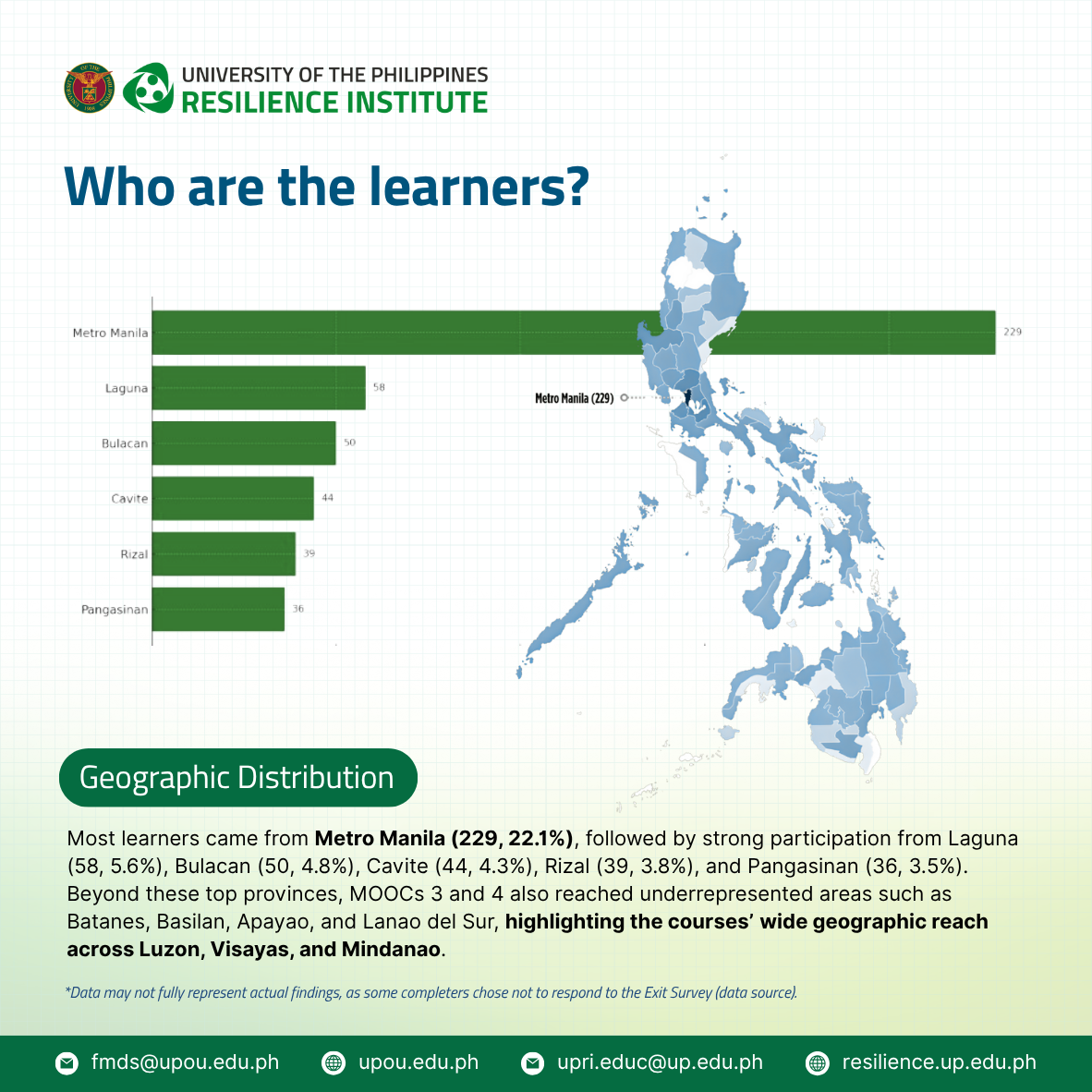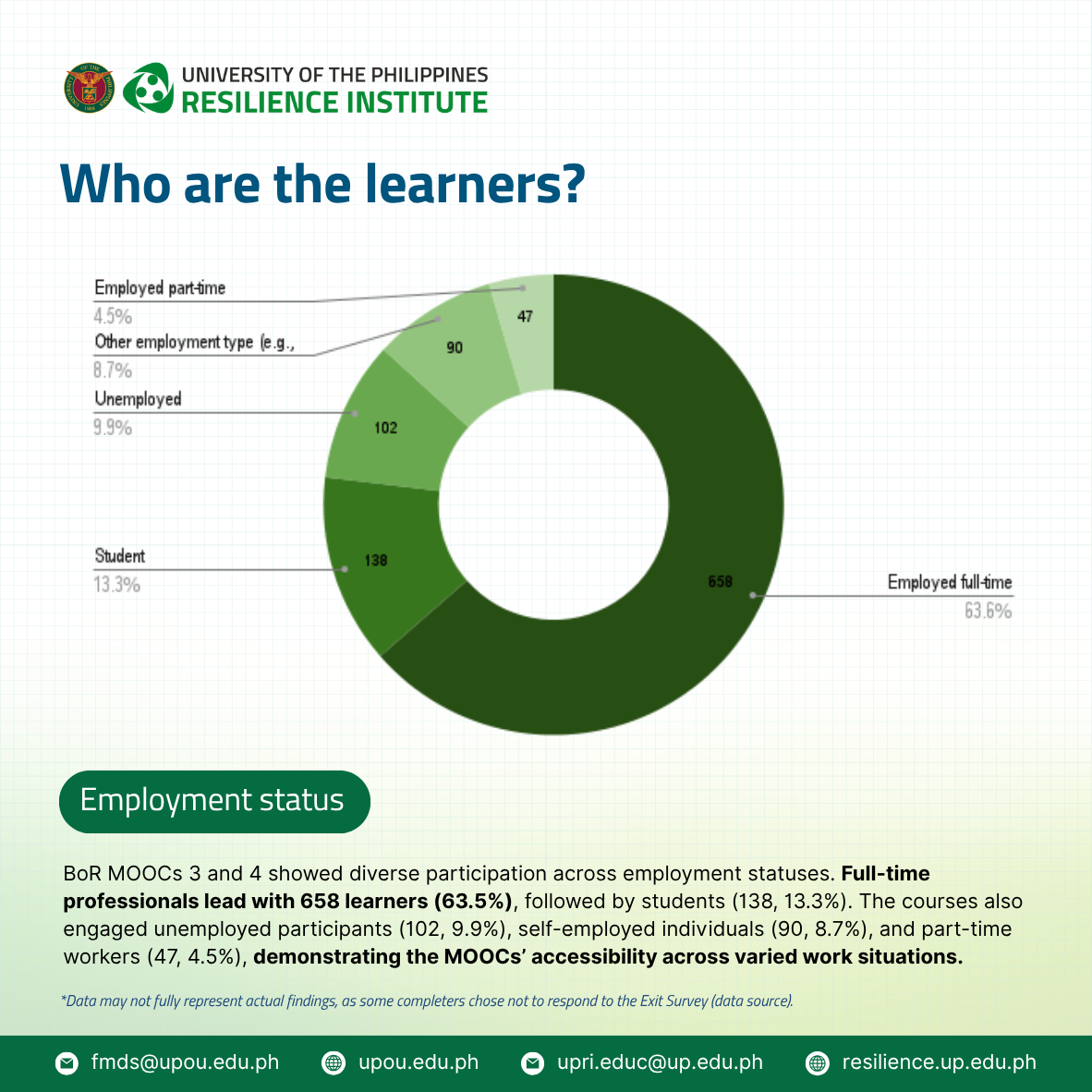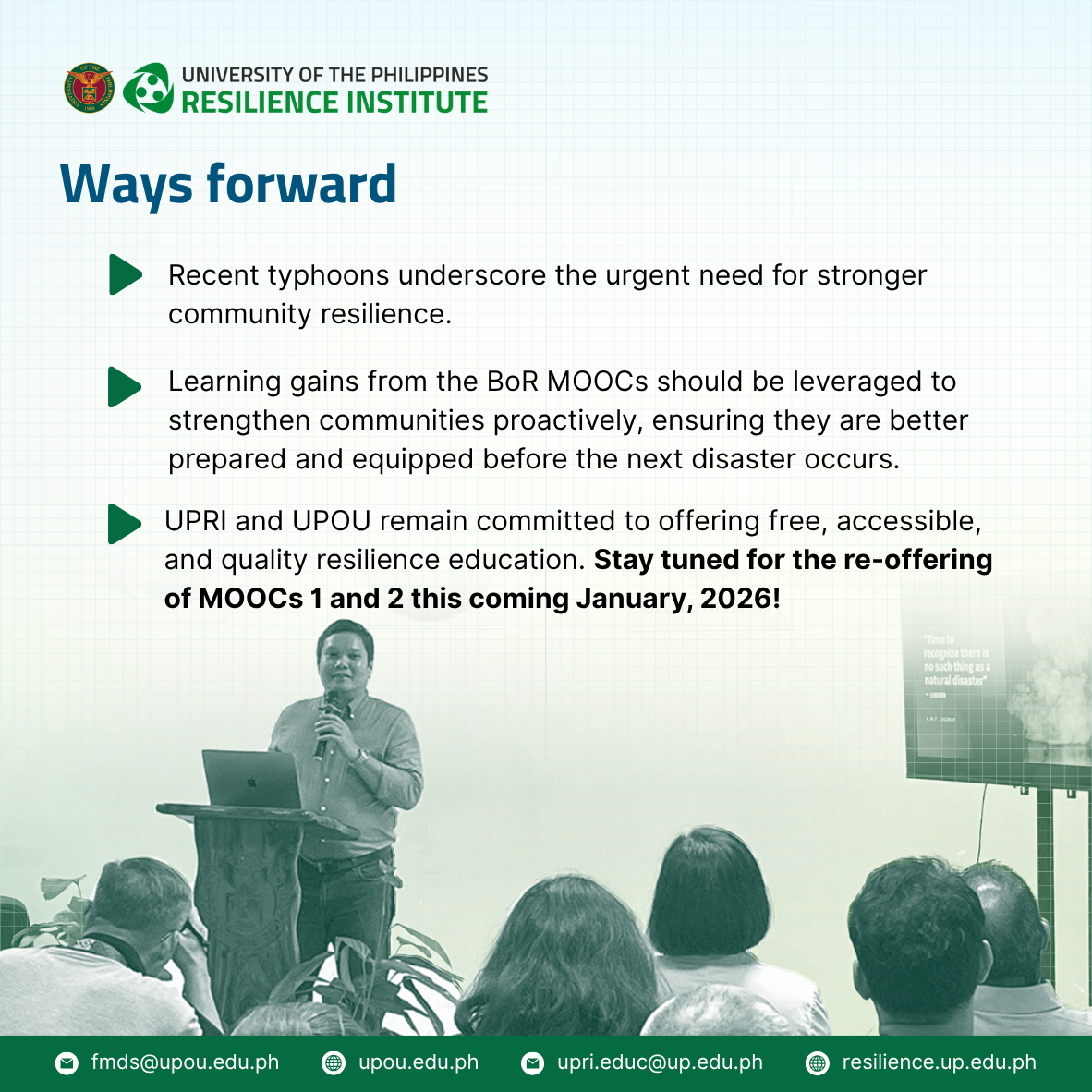Written by: Ma. Shara Micah Oliquino with contributions from Gabriel Tan (Data extraction support) and Evangeline Lucille Ortiz (Design & Layout)

From October 13 to November 10, 2025, the UP Resilience Institute (UPRI) and UP Open University (UPOU) successfully concluded the relaunch of MOOC 3: Overview of Policies and Strategies for Climate and Disaster Resilience and MOOC 4: Resilience Strategies Across the Four Pillars, engaging thousands of participants from diverse backgrounds united by the goal of strengthening climate and disaster resilience within themselves and their communities. This marks the completion of the second cycle of the Basics of Resilience (BoR) Massive Open Online Courses (MOOC) Series for 2025.
In this latest offering, learners explored local and international frameworks and policies shaping climate and disaster resilience practices worldwide, as well as the four pillars of disaster resilience: Prevention & Mitigation, Preparedness, Response, and Recovery & Rehabilitation. These courses highlight how education continues to be a driving force, empowering communities to become more aware, proactive, and capable of addressing the challenges posed by disaster risks and climate change. Through the BoR MOOCs, we remain dedicated to expanding knowledge and building skills in resilience in ways that are free, accessible, and inclusive, reaching Filipinos even in the most underserved communities.
ABOUT THE LEARNERS OF MOOCS 3 AND 4
Geographic distribution: From Luzon to Mindanao, learners across the nation!

In terms of geographic distribution, most of our learners come from Metro Manila, with 229 participants, representing 22.1% of the total sample. Other provinces with strong participation include Laguna (58, 5.6%), Bulacan (50, 4.8%), Cavite (44, 4.3%), Rizal (39, 3.8%), and Pangasinan (36, 3.5%), collectively accounting for over 40% of the participating learners. Beyond the top provinces, we have also reached learners from underrepresented areas such as Batanes, Basilan, Apayao, and Lanao del Sur, showcasing the wide geographic reach and impact of our MOOCs 3 and 4 across the three major island groups of the Philippines.
Highest educational attainment: A vibrant mix of early school completers, bachelor’s, and advanced degree program holders

With regards to the learners’ highest educational attainment, we have been joined by participants ranging from primary and secondary school completers to college, graduate, and post-graduate degree holders. The data reveals that college graduates take the lead, with 586 participants (56.6% of the total sample). This is followed by graduate degree holders at the master’s level, with 199 participants (19.2%), and those with graduate diplomas or certificates, accounting for 57 participants (5.5%). While a majority of learners possess college-level and advanced degrees, the BoR MOOCs once again demonstrate that resilience education remains accessible and inclusive, even for learners who have completed only primary or secondary schooling.
Work affiliation: Bringing together the government, NGOs, academia, and private sector

The distribution of learners’ work affiliations shows strong participation across government, civil society groups, academia, and the private sectors. A majority of MOOCs 3 and 4 learners come from the government sector, with 410 participants representing over half of the total sample (51.6%). This highlights the BoR MOOCs’ strong appeal to individuals engaged in public service and those who play key roles in policy-making and implementing local disaster risk management efforts. The academia and private sector follow with 165 (20.8%) and 161 (20.3%) participants, respectively. This indicates that resilience education is also embedded in teaching, research, and school initiatives, as well as the private sector’s growing awareness of the influence of disaster and climate-related risks in industries and vice versa.
Employment status: Students, professionals, and self-employed individuals learning together

The BoR MOOCs 3 and 4 demonstrate diverse participation across different employment statuses. A majority of learners, 658 participants (63.5%), are full-time professionals, suggesting they may be applying resilience concepts directly to their current roles. The second-largest group, students with 138 participants (13.3%), reflects growing interest among learners seeking to enhance their knowledge and skills in resilience for application in their academic programs. The courses also attracted engagement from those currently unemployed (102, 9.9%), self-employed individuals (90, 8.7%), and part-time workers (47, 4.5%), highlighting the MOOCs’ opened opportunities for learners across different employment situations.
OVERALL PERCEPTION OF LEARNERS TO MOOCS 3 AND 4
For this offering, learners provided promising feedback, giving MOOCs 3 and 4 an overall average rating of 4.7 out of 5. Learners rated the courses positively in terms of platform accessibility, relevance and engagement of learning materials, effectiveness of assessments, interaction with teachers and fellow learners, pacing, and overall satisfaction, indicating that the MOOCs successfully met their expectations.

Hosted through an open and distance e-learning modality, UPRI, in collaboration with the pioneering institution for distance learning, UPOU, strives to ensure that the BoR MOOCs adhere to high-quality standards by focusing on the following key aspects:
- Providing the most conducive and accessible online learning platform for learners across different walks of life;
- Offering up-to-date and engaging teaching and learning materials that reflect the socio-cultural context and disaster resilience realities of the Filipino people;
- Implementing accurate assessment measures to evaluate and enhance learners’ understanding of disaster risk reduction and management;
- Encouraging collaborative interaction among teachers and learners, promoting the open and continuous exchange of knowledge and insights in climate and disaster resilience; and
- Facilitating flexible learning opportunities for all, overcoming geographical constraints and socio-economic challenges.
CONTINUING RESILIENCE EDUCATION IN THE FACE OF ONGOING DISASTER AND CLIMATE REALITIES

After the recent typhoons that hit many parts of the country, the need for resilience education has never been clearer. The knowledge, attitude, and skills gained through programs like the BoR MOOCs are more than just numbers, they are part of a shared effort to help communities prepare for the next disaster. By applying what they have learned, participants can strengthen local capacities, reduce risks, and promote a culture of preparedness, helping communities become safer and more resilient in the face of future challenges.
If you have not joined the Basics of Resilience MOOC Series yet, follow our official social media channels for updates on the next round of offerings. Mark your calendars for January 2026, when MOOCs 1 and 2 will be relaunched!
Let’s keep learning, preparing, and building a culture of resilience together.
